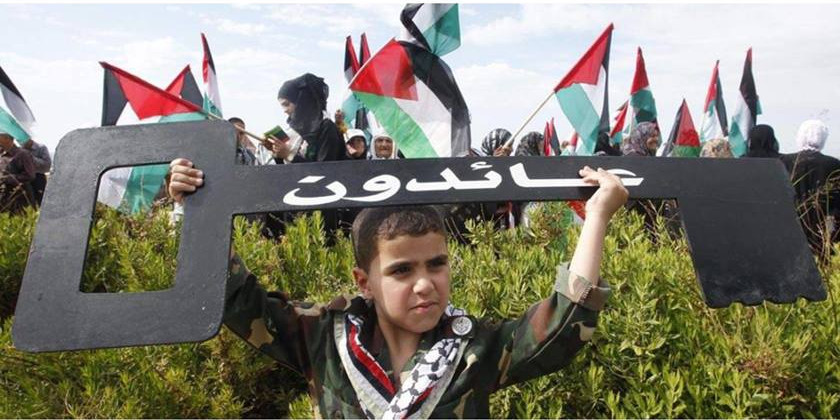Since the start of the year, Israel has killed at least 150 Palestinians, including children.
Palestinians displaced by the ongoing Israeli occupation of their homeland noted that while the United Nations’ commemoration of Nakba Day is an important step, they urge more action from the international community.
On Monday, the UN commemorated the 75th Nakba Day for the first time following the adoption of a resolution in December last year.
Speaking to Doha News on the day, Sari Sabatin, a Palestinian refugee from the displaced village of Al-Dawayima said the “recognition raises global awareness about the historical and ongoing displacement of Palestinians during the establishment of Israel in 1948”.
“It provides Palestinians with a global platform to share their narratives and experiences, further underscoring the importance of their struggle for justice, self-determination, and the right of return for all Palestinian refugees,” Sabatin said.
The first commemoration was held at the UN’s headquarters in New York and on the 75th anniversary of the Nakba, or “catastrophe”. The Nakba marks the beginnings of the mass expulsion of Palestinians in 1948 by Zionist militias to establish Israel.
Sabatin said that UN agencies, including the Relief and Works Agency for Palestine Refugees in the Near East (UNRWA) helped provide humanitarian aid to Palestinian refugees while providing a platform for dialogue, but its actions have been politicised.
“Their actions are subject to global political forces, particularly the ruling party of the United States of America and the veto-wielding powers in the Security Council. As a result, the enforcement of resolutions is limited, and violations of international law often go without sufficient accountability,” Sabatin said.
Between 1947 and 1949, at least 750,000 Palestinian from a 1.9 million native population were forced out of their own land as Zionist militias ethnically cleansed and destroyed at least 530 villages and cities.
Palestine was only granted the status of a “non-member observer state” at the international organisation in 2012 under a resolution adopted by the General Assembly while Israel enjoys a full membership.
“Israel’s full membership in the UN bestows upon it specific privileges and influence within the UN system, enabling it to fully engage in decision-making processes, propose resolutions, and exercise voting rights,” Sabatin explained.
Granting Palestine a full membership would require the green-light from the Security Council where the US, Israel’s closest ally, holds veto power.
The full UN membership, if granted, would mean Palestine’s statehood is recognised internationally. In 1947, the UN was also at the centre of criticism for adopting a resolution that split up Palestine, paving the way for the Nakba.
“The UN has actively supported peace negotiations between Israel and Palestine, exemplified by its involvement in initiatives like the Oslo Accords and the Roadmap for Peace. However, it is important to acknowledge that this position does not fully represent the Palestinian people,” Sabatin said.
The Palestinian refugee maintained that the UN still has the potential to serve the Palestinian cause “given its historical importance and its capacity to monitor the crimes committed by the occupying power.”
“However, external political forces exert influence on the UN in ways that often contradict its intended work and role,” he said.
While the Nakba is associated with a specific date, it has continued over the decades under the ongoing Israeli occupation, which continues to forcibly displace, kill, and detain Palestinians.
Between 2009 and 2022, Israel demolished at least 8,413 Palestinian structures, as per figures shared by the UN Office for the Coordination of Humanitarian Affairs (OCHA).
According to 2020 figures by the Palestinian Central Bureau of Statistics (PCBS), there are up to 5.6 million Palestinian refugees, with at least 28.4% scattered in 58 UNRWA-run camps in Jordan, Syria, Lebanon, the West Bank and Gaza.
“The Nakba began in 1948 and persists till this day, subjecting Palestinians to forced displacement, land confiscation, settlement expansion, and other policies that perpetuate the seizure of their property,” Sabatin said.
Since the start of the year, Israel has killed at least 150 Palestinians, including children. Out of the total figure, at least 33 were killed during the most recent five-day Israeli bombardment of Gaza.
To date, Britain has yet to publicly apologise to Palestinians for the Balfour declaration, which approved the establishment of Israel.
“Acknowledging the preceding Balfour Declaration, is a crucial step toward comprehending the historical and ongoing grievances faced by the Palestinian people[…]In order to bring an end to the Nakba, it is necessary for every Palestinian to be able to reclaim their land and for the occupation to cease,” Sabatin said.







